General Strike Staged Across Iran For Second Day
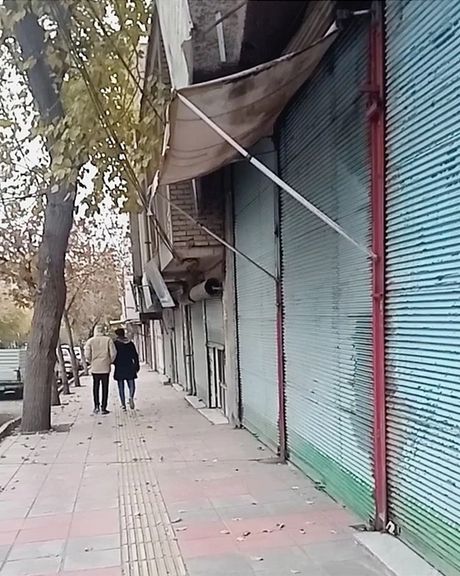
Protests and strikes in Iran continue for the second day in response to calls from underground activists for a three-day nationwide action until December 7.

Protests and strikes in Iran continue for the second day in response to calls from underground activists for a three-day nationwide action until December 7.
Numerous reports and videos from all over Iran show that retail businesses in many cities are in shutdown mode as shops and markets remain closed.
Despite threats by security forces, shop owners kept their doors shut in many provinces including Tehran, Azarbaijan, Ardebil, Kerman, Zanjan, Esfahan, Kordestan, Kermanshah and several others to play their role in toppling the clerical rulers.
Iran has been rocked by nationwide protests following the death of Mahsa Amini on September 16 in police custody, posing one of the toughest challenges to the Islamic regime since the 1979 revolution.
In addition to the markets and shops, industrial workers also joined the strikes; among them, some 500 contractors of Mahshahr Petrochemicals Company.
Regime officials downplayed the extent of strikes and threatened people to stop the protest movement.
The Judiciary on Tuesday said five more protesters have been sentenced to death seemingly to intimidate the demonstrators.
Tasnim News Agency, IRGC’s mouthpiece, reported that only few strikes were staged on Monday. Meanwhile, Judiciary Chief Gholam Hossein Mohseni Ejei Monday ordered to identify, arrest, and prosecute organizers of the strikes “quickly and decisively,” claiming that some protesters force business owners to close their shops.
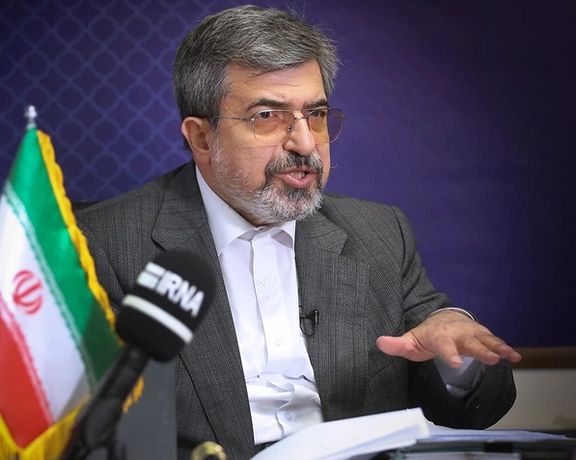
An Iranian official says five people have received death sentences for “killing a member of Basij plainclothes militia” during protests near Tehran in November.
Judiciary Spokesman Masoud Setayeshi said Tuesday that 16 people had been arrested in the case, among them three minors.
Members of Basij paramilitary are armed and deployed to crack down on protesters, often killing civilians in the streets.
He went on to say that five of them, whose names were not released, are accused of killing Rouhollah Ajamian in the city of Karaj west of Tehran on November 3.
Setayeshi stated that 11 others, including three children will face long prison terms on charges of “corruption on earth” and disrupting national security.
However, he said the verdicts are not final and the sentences can be appealed.
Iran’s Judiciary can frame people for crimes they did not commit, as multiple cases have demonstrated in the past. It can define what “disruption” means and sentence any protester to death for causing an ill-defined act of disruption.
One of the biggest challenges to Iran's clerical leaders since the 1979 Islamic Revolution, the twelve-week-old demonstrations have persisted despite a deadly crackdown and severe warnings from security forces.
Iran’s use of the death penalty for protesters has been sharply criticized by the United Nations while some countries and many right groups have also condemned the move.
According to Amnesty International at least 28 inmates currently face execution for participation in the demonstrations.
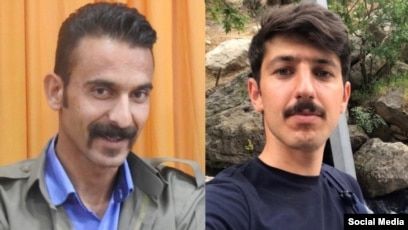
Following the re-broadcast of coerced confessions from four Kurdish political prisoners on Iran’s state television, concerns about their execution have mounted.
The political prisoners are identified as Pejman Fatehi, Vafa (Wafa) Azarbar, Mohsen Mazloum and Hajir (Hazhir) Faramarezi whose forced confessions were recently broadcast for the second time on state TV.
Regime’s judiciary also announced that four other people will be hanged on charges of “kidnapping as well as intelligence cooperation with the Mossad.”
Mizan news agency, affiliated with the judiciary, later announced the four people named Hossein Urdukhanzadeh, Shahin Imani Mahmoudabad, Milad Ashrafi Atbatan and Manouchehr Shahbandi Bajandi were executed Sunday morning.
Oslo-based Iran Human Rights Organization says with the execution of the four citizens, the number of executions this year exceeded 500.
In late October, the judiciary of the Islamic Republic announced the indictment of ten people, who were introduced as “Mossad-related agents,” saying that four of them were accused of “corruption on earth;” a charge that leads to death penalty.
The judiciary did not reveal their identity and the date of their arrest, but only announced they were detained in West Azarbaijan province.
Previously, the intelligence ministry had claimed to have arrested operatives of Komala organization “who were Mossad agents,” but the Komala Party of Iranian Kurdistan rejected the claim, confirming that several of its members have been apprehended in Iran.
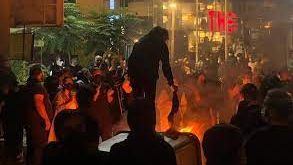
Comments made by Iran's hardliners, amid a serious popular challenge to the regime, reveal that they still have no true grasp of what is going on in the country.
Some hardliners, like Iran's Interior Minister Ahmad Vahidi appear to be repeating what they hear from others or in the news.
Vahidi told reporters about a fact-finding committee to investigate the ongoing protests, but he said dissidents cannot be part of the investigation. He added that what the government is facing are "riots" rather than "protests".
The committee, comprised of security organizations and "independent" lawyers, will be tasked with "finding the players," among the “rioters” meaning that it is not really a fact-finding committee but a chase and crackdown group. Previously Vahidi had talked about an investigative group which was supposed to uphold the rights of those who have sustained losses during the protests.
The only thing he knew was that it is a ‘fact-finding committee’, a term he must have heard in the news from the UN about establishing an international fact-finding mission to probe into violations of human rights in Iran during the protests since mid-September.
Furthermore, he spoke about independent lawyers at a time when more than two dozen are in jail for trying to represent and help human rights activists including other lawyers.
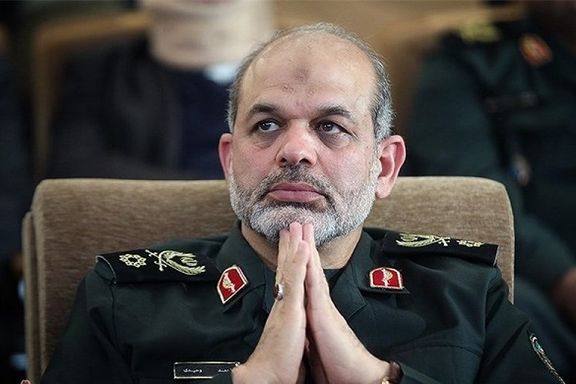
Lawmaker Shahryar Heidari of the Majles National Security Committee has told ILNA that the committee set up by Vahidi is going to be "useless".
Meanwhile, figures Vahidi presented on casualties among protesters contradicted what other officials have said. He mentioned 200 individuals who were killed "during the riots,” while IRGC's General Hajizadeh put the number of those killed at "more than 300". Human rights organizations say there are between 450-500 verified cases of deaths.
In another development, one of Vahidi’s deputies, Majid Mir Ahmadi, has made outlandish remarks about the protests in an interview. Mir Ahmadi said some "rioters" receive 500 million rials ($1400) for attacking each security officer. He added that some female protesters were assigned to offer indecent proposals to young men to spend a few nights with them if they promised to take part in the "riots".
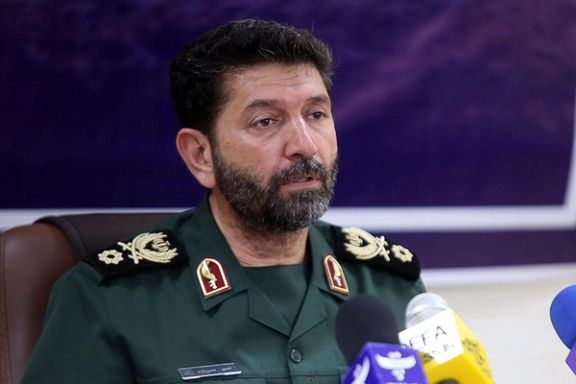
In yet another report, Hassan Hassanzadeh, the commander of the IRGC Headquarters in Tehran said the United States has spent 55 trillion dollars to establish media in Arab states and countries around Iran to steer the protests (It is not a typo. He really said $55 trillion).
Reformist activist Feyzollah Arabsorkhi reminded him in a tweet that the United States' annual Gross Domestic Product is only 25 trillion dollars.
This shows either the lack of basic education on the part of senior IRGC officers or their ability to utter fantastic lies.
On the more pragmatic side, Majles Speaker Mohammad Bagher Ghalibaf appears to have retreated from his idea of introducing a "new form of governance” for Iran as the reformist website Etemad Online reported. According to the website, after several highly controversial speeches that were welcomed by some optimistic Iranians, he has finally said that what he meant by new governance was a plan to abide by Iran's forgotten constitution.
While almost every official and politician praises the constitution as the ultimate guide, it appears to have been shelved after Supreme Leader Ali Khamenei took office in 1989. Two of the precepts of the constitution that are much talked about recently are articles that allow peaceful protests and holding referendum about core political disputes in the country.
This comes while conservative politician Hossein Kanani Moghaddam said in an interview that "Talking about a new form of governance without amending the constitution is a joke, particularly in a situation in which people are so pessimistic that they refuse to buy the arguments of any politician or state official."
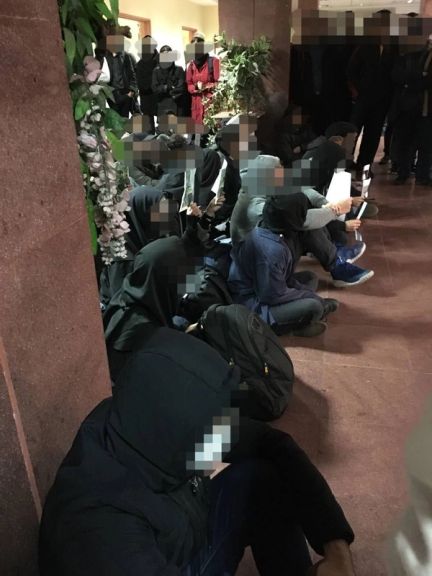
Students at several universities across Iran went on strike Monday and protested by publishing statements in support of ongoing strikes by shop owners and businessmen.
Based on reports and videos received by Iran International Tehran students in the Faculty of Electrical Engineering of the University of Science and Technology went on strike to protest government persecution and arrest of students.
The students of Khajeh Nasir University in the capital also announced a three-day strike saying that “we all stand together for the freedom of our friends.”
At Tehran University's Faculty of Economics, students joined the three-day national strike saying it is “also an objection to professors who not only did not support the people, students and even their colleagues, but stood by the oppressor.”
Students in Esfahan, Shiraz, Rasht, Sanandaj and several others announced they will boycott classes on December 5, 6, and 7 to join the nationwide strikes.
President Ebrahim Raisi, who earlier announced he would deliver a speech at a university on Wednesday, has not revealed the name of the college yet in fear of protests and raliies which might target him.
Students have been at the forefront of demonstrations against Iran’s authoritarian regime within the past twelve weeks.
According to the US-based Human Rights Activists News Agency (HRANA) at least 18,210 protesters have been arrested including 585 students.
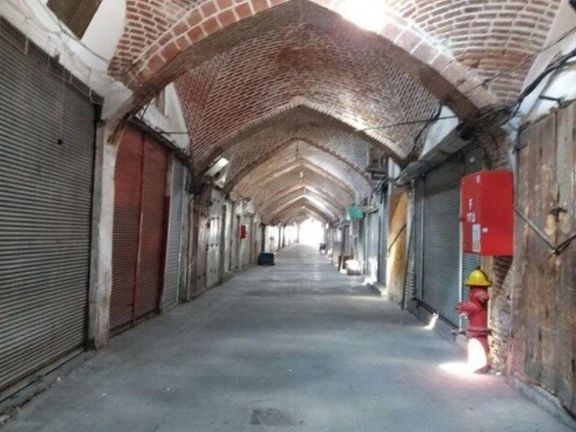
In cold weather and rain, Iranians poured into streets Monday evening to hold antigovernment rallies following students' sit-ins and strikes flaring up across the country.
Iranians embarked on a three-day action on Monday with the calls focused on strikes for December 5 and 6 and rallies for December 7, Student Day in Iran, which marks the anniversary of the 1953 murder of several students at University of Tehran. It is a traditional day of nationwide rallies. To coincide with Student Day, protesters have also called for strikes by businesses and a rally towards Tehran's Azadi (Freedom) Square.
Students in many universities across Iran did not show up for classes on Monday and in some campuses, they held sit-ins and rallies to protest against the Islamic Republic and its repression machine.
Meanwhile, many shops and businesses shut their doors in a nationwide action that was so stunning that the country’s judiciary had to come up with a new propaganda line to justify the strikes. Iran's Chief Justice Gholam-Hossein Mohseni-Ejei blamed "rioters" for threatening shopkeepers. Hardliners led by the Revolutionary Guard call protesters “rioters” and “thugs”.
Emphasizing that the death sentences of several protesters have been confirmed and they will be executed soon – apparently meant to scare the demonstrators to stop their movement to oust the regime -- he added shopkeepers who close their businesses would be swiftly dealt with by the judiciary and security bodies.
Authorities also sealed a jewelry shop and restaurant belonging to Iranian football legend Ali Daei after he closed his businesses to join antigovernment strikes. Since the beginning of the uprising sparked by the death of Mahsa Amini in custody of the hijab – or the so-called “morality” police -- in mid-September, strikes have been staged in support of street protests. The authorities have kept threatening businesses that if they close in support of the protests, they will be fined, or their businesses will be sealed as punishment.
Despite Internet restrictions in many regions of the country, social media is exploding with videos of closed shops in bazaars and markets in a lot of cities and towns. Stores were shut in Tehran's Bazaar, and other large cities such as Karaj, Esfahan, Mashhad, Tabriz, Shiraz, Bojnourd, Kerman, Sabzevar, Ilam, Ardabil and Lahijan. The list of cities goes on as more videos are still being shared online.
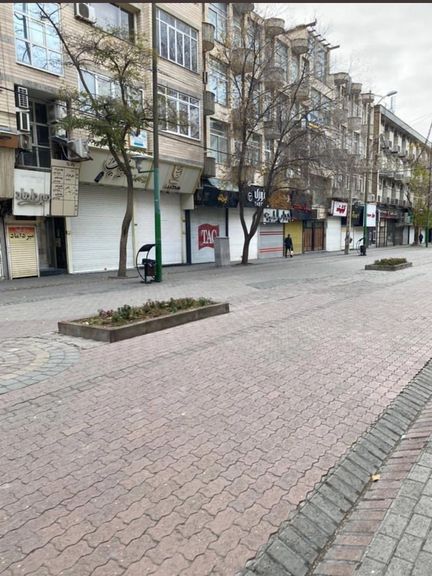
The strikes were especially widespread in Kurdish-majority cities. Hengaw, a Norway-based rights group which monitors abuses in Kurdish areas, reported that 19 cities had joined the strike movement in western Iran, where most of the country's Kurdish population live.
When night fell, however, the same streets that sounded so calm during the day became scenes of antigovernment protests with people chanting slogans against the regime. People in several neighborhoods in large cities, such as the capital Tehran and religious city of Mashhad, blocked roads while chanting slogans and waiting for the security forces to appear. The first rain and snowfall in many cities have led to slippery roads, which protesters relish as a hurdle for the regime’s agents riding on motorcycles. In some social media videos, shots are heard with people saying that security forces opened fire at them.